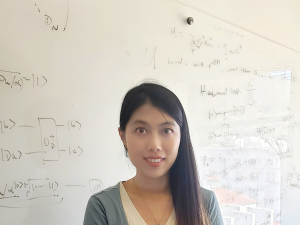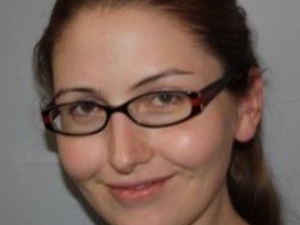Meet our newest Faculty in the Math Department
Shira at the Algebraic CombinatoriXX II workshop at BIRS last summer
I received my PhD from North Carolina State University under the direction of Nathan Reading. My thesis work was in algebraic and geometric combinatorics with a focus on cluster algebras. I teach and coordinate MATH 111L, Laboratory Calculus I.
Along with the understanding of course content, my teaching aims to build students' enjoyment of mathematics and resilience in problem-solving. I do so with enthusiasm, inquiry-oriented activities, and informal, welcoming classroom and office environments.
I am also passionate about mathematical outreach and supporting the participation of women and other underrepresented groups in mathematics: I have led math circle sessions, taught Sonia Kovalevsky Day workshops, and actually first met Sarah Schott and learned about the POP position when I volunteered for the Southeastern Conference for Undergraduate Women in Mathematics at Duke several years ago.
Outside of teaching and doing mathematics, I enjoy ultimate frisbee and baking. This is a photo of the cake I baked for my thesis defense, which illustrated one of my results.
I am thrilled to be part of the Duke Math department as an Assistant Professor of the Practice.
Aaron Pollack
I am an algebraic number theorist, working on the arithmetic side of automorphic forms. Currently, I am thinking about modular forms in exceptional groups. Modular forms are classical objects of number-theoretic interest. To paraphrase a famous quote, they are special functions that have an unusually large set of discrete symmetries. Saying that a modular form is on an exceptional group means that not just is the function special, but so too are the group of symmetries.
The past several years I have worked on Siegel modular forms, arithmetic invariant theory and the Beilinson conjectures. I finished my PhD at Princeton in 2014, was a postdoc at Stanford from 2014 to 2017. This past year I was a member at the Institute for Advanced Study at Princeton (IAS) and began to work on automorphic forms and exceptional groups.
In the coming years, one of the things I will be trying to figure out is how much of the classical theory of modular forms carries over to the setting of exceptional groups. This is an area of research where the number of interesting open questions dwarfs the number of results.
In my freetime I enjoy Durham Bulls games, and to be honest, more math. :)
My NIH and NSF funded research program combines mathematical and statistical modeling techniques to leverage biologic, clinical and population level data with the goal to inform and guide cancer early detection and prevention. Through the synthesis of data across a wide span of spatio-temporal scales, my work provides a nexus between research disciplines and fosters cross-disciplinary team science.
After earning an MSc in Theoretical Physics from the Swiss Federal Institute of Technology Lausanne (EPFL) and a PhD in Mathematics from McGill University, I moved to Duke University where I began working in mathematical oncology under the mentorship of Professors Rick Durrett and Jonathan Mattingly. While holding a Visiting Assistant Professor position in the Department of Mathematics I was awarded a K99/R00 from the National Cancer Institute and then spent two years as a Senior Research Associate in the Department of Surgery. Under the mentorship of Dr. E.S. Hwang, Chief of Breast Surgery, I developed models to quantify the risks and trade-offs associated with active surveillance for patients diagnosed with in situ breast cancer.
In addition to my population health and clinically-oriented research, I also pursue an interdisciplinary line of research in cancer biology. In collaboration with surgeons, molecular biologists and pathologists I combine mathematical models of cancer evolution with multi-regional genomic data to infer the phenotypic evolution during early carcinogenesis. Recently, this work was published in the Proceedings of the National Academy of Sciences and was featured on the NIH Director’s Blog: Are Some Tumors Just Born to be Bad?
I am delighted to join the Mathematics Department at Duke; I have been at UC Santa Cruz for the past 10 years. I am an algebraic number theorist and arithmetic geometer working on questions related to special values of L-functions. I use methods from the theory of modular forms and Iwasawa theory to attack classical problems about algebraic number fields and points on algebraic varieties. Currently, I am working on two important problems related to Stark's conjectures. The first is called the Brumer-Stark conjecture, which is a generalization of Stickelberger's theorem about Gauss Sums to the case of general totally real fields. The second is a conjectural exact p-adic formula for Stark units that I proposed in my Ph.D. thesis; solving this problem would provide a solution to Hilbert's 12th Problem for totally real fields.
In the coming years, I hope to continue understanding the deep connections between modular forms and units in number fields and to expand beyond the framework of L-functions. There is a whole mysterious world of formulas for Stark units and their generalizations to abelian varieties with proofs still waiting to be discovered.
In our free time, my wife Smriti and I enjoy playing with our daughters Shayla, 5, and Sarina, 10 months. We frequent the many wonderful museums in the area, play chess, and have impromptu dance parties in our family room.




